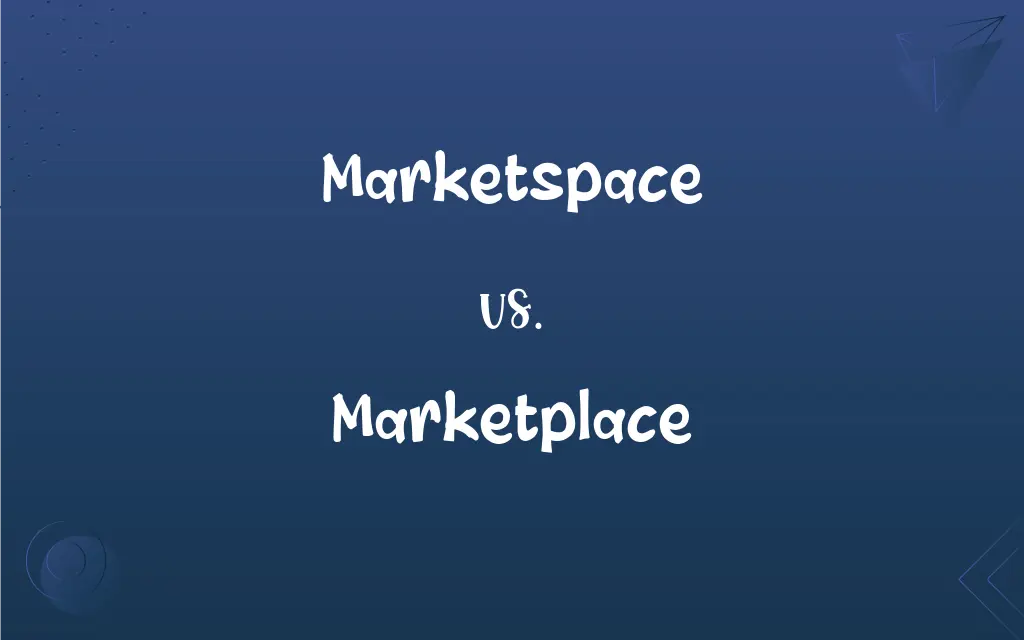Marketspace vs. Marketplace: What's the Difference?
Edited by Aimie Carlson || By Harlon Moss || Published on January 2, 2024
Marketspace refers to digital or online environments where business transactions occur, while marketplace denotes a physical location where goods and services are traded.

Key Differences
Marketspace represents the virtual realm of commerce, primarily conducted over the internet. In contrast, a marketplace is a physical location, like a store or a bazaar, where buyers and sellers interact face-to-face.
Transactions in a marketspace occur electronically, offering global reach and 24/7 accessibility. Marketplaces, on the other hand, are bound by geographical and temporal constraints, such as operating hours and location.
In a marketspace, the focus is on digital marketing strategies to attract customers. In marketplaces, physical presentation, location, and direct customer interaction play key roles.
Marketspaces often provide a broader range of options and competitive pricing due to lower overhead costs. Traditional marketplaces, while potentially more limited in scope, offer the advantage of immediate product inspection and instant transactions.
User experience in marketspaces is influenced by website design and ease of online transactions. In marketplaces, the sensory experience, including the ability to touch and feel products, is paramount.
ADVERTISEMENT
Comparison Chart
Environment
Digital, online
Physical, tangible
Accessibility
Global, 24/7
Geographically and time-bound
Transaction Mode
Electronic, remote
In-person, immediate
Marketing Focus
Digital strategies
Physical presentation, location
Product Interaction
Virtual
Direct, tangible
ADVERTISEMENT
Marketspace and Marketplace Definitions
Marketspace
A digital environment for online commerce.
The company's marketspace allowed customers to shop from anywhere in the world.
Marketplace
A traditional setting for commerce and trade.
The marketplace in the town center attracted tourists and locals alike.
Marketspace
A web-based marketplace.
Small businesses found the marketspace crucial for reaching a wider audience.
Marketplace
A physical venue for buyer-seller interaction.
The marketplace offered a variety of handmade crafts.
Marketspace
Virtual space for buying and selling goods.
Their marketspace featured a wide range of digital products.
Marketplace
A physical location where goods are sold.
The local marketplace was bustling with vendors and shoppers.
Marketspace
An online platform for commercial transactions.
The marketspace streamlined the purchasing process with its user-friendly interface.
Marketplace
An area or venue for selling goods or services.
Farmers brought their produce to the weekly marketplace.
Marketspace
E-commerce sites and digital platforms.
The new app was designed to enhance the user experience in the marketspace.
Marketplace
A public space for commercial exchange.
The festive atmosphere of the holiday marketplace was enchanting.
Marketspace
A virtual marketplace on the Internet.
Marketplace
An open area or square in a town where a public market or sale is set up.
Marketplace
The world of business and commerce.
FAQs
What is a marketplace?
A marketplace is a physical location where goods and services are bought and sold.
What is a marketspace?
A marketspace is a digital environment for conducting business transactions online.
Are marketplaces restricted by location?
Yes, marketplaces are bound by their physical location.
What is the main marketing strategy in a marketspace?
Digital marketing strategies are key in a marketspace.
Do marketplaces offer immediate product inspection?
Yes, marketplaces allow for immediate product inspection and purchase.
Can a marketspace operate 24/7?
Yes, a marketspace can operate continuously, offering 24/7 accessibility.
Are products in a marketspace physically tangible?
No, product interaction in a marketspace is virtual.
Can small businesses benefit from marketspaces?
Yes, marketspaces can be crucial for small businesses to reach a wider audience.
Do marketspaces require physical infrastructure?
No, marketspaces operate digitally without needing physical infrastructure.
Are marketplaces important for local economies?
Yes, marketplaces play a significant role in local economies and communities.
How do transactions differ in a marketspace vs. a marketplace?
Transactions in a marketspace are electronic, while in a marketplace, they are in-person.
Is a marketplace limited to specific operating hours?
Typically, yes, marketplaces have specific operating hours.
Can marketplaces offer unique or artisan products?
Yes, marketplaces are known for offering unique, artisan, and local products.
How does customer interaction work in a marketplace?
In a marketplace, customer interaction is direct and face-to-face.
Can you haggle prices in a marketplace?
Yes, haggling is often a part of the buying experience in marketplaces.
Are marketspaces more cost-effective than marketplaces?
Generally, yes, due to lower overhead costs in marketspaces.
Do marketplaces offer a sensory shopping experience?
Yes, marketplaces provide a sensory experience with the ability to see, touch, and feel products.
How does technology impact marketspaces?
Technology is central to marketspaces, driving their operation and user experience.
Do marketspaces facilitate easy comparison shopping?
Yes, marketspaces allow easy comparison of products and prices online.
How does a marketspace affect global commerce?
Marketspaces facilitate global commerce by breaking down geographical barriers.
About Author
Written by
Harlon MossHarlon is a seasoned quality moderator and accomplished content writer for Difference Wiki. An alumnus of the prestigious University of California, he earned his degree in Computer Science. Leveraging his academic background, Harlon brings a meticulous and informed perspective to his work, ensuring content accuracy and excellence.
Edited by
Aimie CarlsonAimie Carlson, holding a master's degree in English literature, is a fervent English language enthusiast. She lends her writing talents to Difference Wiki, a prominent website that specializes in comparisons, offering readers insightful analyses that both captivate and inform.






































































